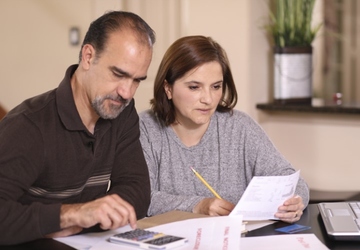Getting on the path to homeownership in 2024 is an exciting endeavor, but it often requires navigating the intricacies of financial decisions and paperwork. When you're eyeing your dream home, it's crucial to understand the complexities of getting a mortgage.
This guide uses a conversational, simplified approach to break down the process into manageable steps. Whether you're a first-time homebuyer or a seasoned homeowner, our top four tips and additional guidance will help you navigate the changing mortgage buying landscape with confidence and ease.

Check your credit score: Credit report decider
Your credit score is key to getting a mortgage. Lenders use it to evaluate your creditworthiness. So the first step is to check your credit score. Sites like Credit Karma or AnnualCreditReport.com can help you get a free copy. Assuming your results are outstanding, that's great! If not, don't panic. There are still options available, but a higher score usually means a better interest rate. If you find an error in your report, please dispute it immediately. A clean credit report sets the stage for a smoother mortgage loan process.
Savings for a down payment: Savings stocks
Let’s talk about money. Most lenders require a down payment, which is a percentage of the home's purchase price that you pay up front. While the traditional 20% down payment is the standard, there are some loan options with lower down payments, sometimes as low as 3%. Start putting this money into a separate savings account. It shows your ability to save and helps you when you need to pay closing costs. The more you pay, the higher your loan amount will be and the lower your monthly payments will be.
Know Your Budget: Spending Plan
Before you start buying a home, it's important to know what you can afford. Your debt-to-income ratio (DTI) plays an important role. It is the percentage of your monthly income that goes toward debt repayment. Typically, lenders prefer a DTI of 43% or lower. To calculate your debt, add up all of your monthly debts (credit cards, car loans, student loans) and divide by your gross monthly income. This will give you a clear idea of how much you can afford to pay without going into debt.
Find a Lender: Find a Loan
Not all lenders are the same; neither are mortgage options. It's worth shopping around and exploring different lenders to find the best deal for your situation. Local banks, credit unions, and online lenders offer different offers. Get quotes from multiple lenders and compare interest rates, loan terms and fees. Don’t be afraid to negotiate or ask questions. A mortgage is a long-term commitment, so finding the one that's right for you is crucial.
Organize Your Financial Documents: Paperwork Party
Be prepared to sell and present your financial life. Lenders will want to see many documents, including tax returns, W-2s, pay stubs, bank statements and any other sources of income. Organizing and providing these documents can speed up the mortgage loan process. Create a checklist to make sure you have everything you need. If you are self-employed or have a special financial situation, you must be prepared to provide additional documentation. The smoother you complete the paperwork, the faster you'll be approved for a mortgage.
Consider Closing Costs: Sneaky Fees
Closing costs are an often overlooked cost of completing the home purchase process. These include costs for appraisals, inspections, title searches, and more. In addition to the down payment, it’s important to consider these costs. Ask your lender for a loan estimate to break down expected costs. How to avoid surprises on closing day. Some closing costs are negotiable. So don’t hesitate to discuss this with your lender and check if there is room for adjustment.
Be patient and flexible: the waiting game
Once you've submitted your mortgage application, the wait begins. The approval process may take some time and additional information may be requested during the process. It is important to remain patient and be prepared to provide any necessary updates in a timely manner. At the same time, avoid major financial decisions or changes. Now is not the time to open new credit accounts or make large purchases, as this may affect your credit score. Be flexible with your schedule and remember, good things come to those who wait.
Consider Mortgage Insurance Options: Protection Plans

Depending on the amount of your down payment, you may be required to purchase mortgage insurance. This insurance protects the lender in the event of default. This incurs additional fees but can make homeownership more accessible, especially for those with a smaller down payment. There are several types of mortgage insurance, including Private Mortgage Insurance (PMI) and Federal Housing Administration (FHA) Premium Mortgage Insurance. Explore these options with your lender to understand the costs and work them into your budget. Remember, once you build enough equity in your home, you can cancel or refinance to eliminate the need for mortgage insurance.
Homeownership Cost Planning: Post-Mortgage Budgeting
Homeownership involves more costs than just a mortgage. You also need to consider property taxes, home insurance, utilities and ongoing maintenance costs. In order to comfortably afford your new home, it's important to budget for these additional costs. Research property tax rates in your area and get home insurance quotes to estimate these ongoing costs. Setting aside separate funds for home maintenance will help you handle unexpected repairs without putting a strain on your budget. Understanding the complete financial picture of home ownership will prepare you for the responsibilities you'll take on once you get a mortgage.
Conclusion
By the time you finish reading this guide, you'll have a comprehensive understanding of the key steps to getting a mortgage in 2024. From checking your credit score and saving for a down payment, to finding a lender and understanding what additional fees you may incur, the insights you gain will be useful on your home buying journey. Remember: Patience and flexibility are your allies. Understanding all aspects of getting a mortgage will help you make informed financial decisions. May your home ownership journey be smooth sailing, and may your new home be a place where memories bloom.


